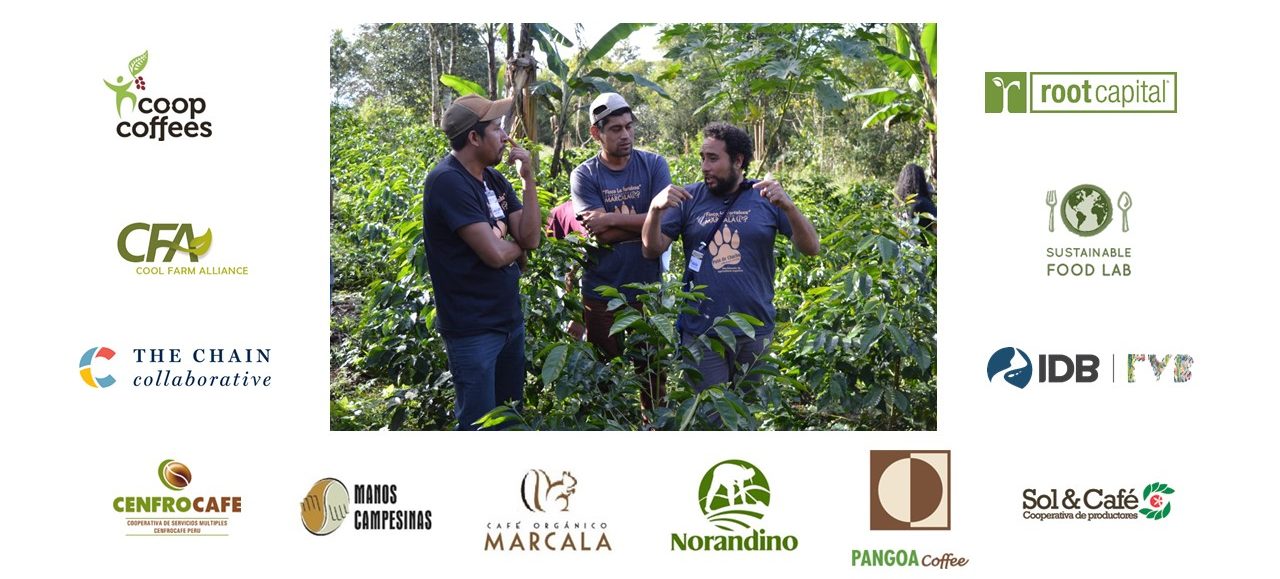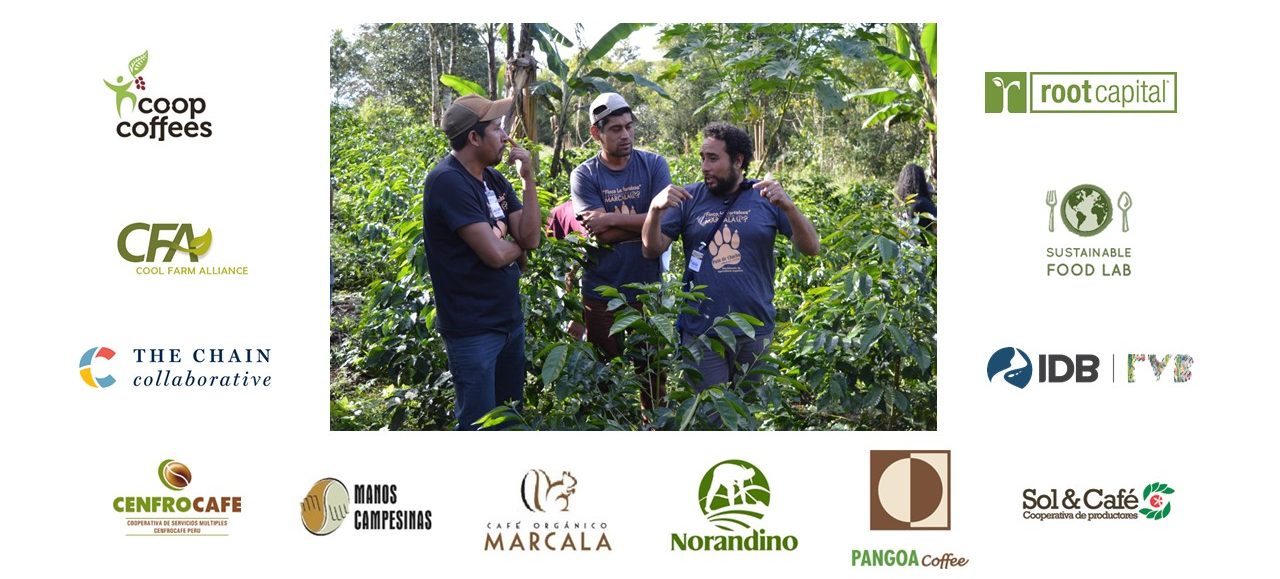

- Digital carbon measuring tool newly adapted to coffee is being piloted among 250 smallholder coffee farmers in Peru, Honduras, and Guatemala
- This industry-wide partnership between IDB Lab, Cooperative Coffees, Root Capital, Sustainable Food Lab, The Chain Collaborative, Manos Campesinas, COMSA, Sol y Café, CENFROCAFE, Norandino, and Pangoa could be the beginning of a truly climate-oriented coffee industry
MARCH 16, 2021 – Cooperative Coffees, Root Capital, Sustainable Food Lab, The Chain Collaborative, and six organic coffee cooperatives throughout Honduras, Guatemala, and Peru have launched a new climate action project, funded by IDB Lab. Together, these organizations are piloting the use of the innovative Cool Farm Tool on organic coffee farms. The Cool Farm Tool is a digital carbon calculation application designed to enable farmers to track and understand the environmental impact of their production and determine the best organic practices for climate resiliency and crop health. The launch of this project, focused on training individual farmers in the use of the Cool Farm Tool, marks the beginning of an industry-wide effort to recognize farmers’ leadership in mitigating climate change. In particular, the project partners aim to improve farmer livelihoods and incentivize carbon capture by ensuring roasters and importers can pay for it, or reward it, through the establishment of a voluntary industry-wide soil carbon premium.
The six participating organic coffee cooperatives—Manos Campesinas in Guatemala, Café Orgánico Marcala (COMSA) in western Honduras, and Sol y Café, CENFROCAFE, Norandino, and CAC Pangoa in Peru—have begun to pilot use of the tool with a small number of landholders, enabling initial data analysis. Over the course of three years, a total of 250 small-scale farmers will benefit from the training and help guide the creation of a fully scalable model for the future. The end goal is for the tool to increase both biological and income diversity on smallholder coffee farms, which are on the frontlines of our changing climate. While the project will initially benefit a select number of smallholder organic family farmers, the cooperatives plan to extend the opportunity to track carbon impact, using the Cool Farm Tool, to the 12,500 farmers in their collective membership. During the pilot phase, the partners will analyze a variety of on-farm contexts in order to lay the groundwork for a broader implementation that can reach the greater global community of 25 million smallholder coffee farmers.
Once able to scale, the Cool Farm Tool will allow the entire supply chain to assume climate action by placing a value on individual farms that are implementing sustainable agricultural practices. The tool, available to farmers on the web at no cost, was originally developed at the University of Aberdeen in partnership with Unilever and the Sustainable Food Lab. It is structured around a series of drop-down menus that allow farmers to input data about their farming practices and receive immediate feedback on their environmental impact, providing a way to evaluate sustainability at every step of production. Farmers can also see the impact of new practices by entering new data and assessing the potential changes of those new inputs as it relates to net carbon capture. This aids in decision-making processes, as farmers are able to see in real time the sequestration potential of one practice over another.
Unlike industrial agriculture, small-scale organic agriculture holds enormous potential in the mitigation of climate change—something the participating cooperatives know well. “We are part of the solution, we always have been, and at the same time we are aware that we can do more,” says Fernando Aguirre, a technical assistant and forestry engineer at Sol y Café in northern Peru. With greater access to the Cool Farm Tool, farmers will be able to see just how much more they can do, and demonstrate their environmental service to others in the supply chain.
Cool Farm Alliance will join a webinar series hosted by Digital Coffee Future on April 8th at 11 am EDT, where they plan to share more information about this project. The three-part webinar series begins on March 25th at 11 am EST, and will focus on the nexus between climate change and coffee digitalization. For webinar registration, visit the Digital Coffee Future website. For more information about the Cool Farm Tool project in general, contact Nora Burkey at nora@thechaincollaborative.org.